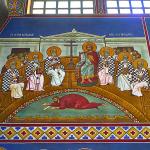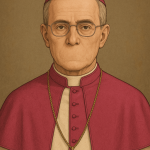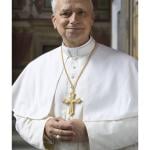Word of the Day: brethren.
I like the word brethren. Its specialized use is to denote members of a solemn or sacred brotherhood, sometimes including women too. Nobody would now say, “I have three sisters and two brethren,” unless he was telling a joke; he’s a member of an order of priests, and there are three nuns next door. Brothers will do. But sometimes the older word is more powerful: “Brethren, let us now consider the matter before us.”
How did it get to be brethren, anyhow? The Old English word was brothor. It sometimes formed its plural in an old fashioned way: umlaut, a vowel-turn. That plural was brether. That happened because of a y-sound: *brothrj, the j pronounced like a hard y. Make that sound: say the old word ye. Say it loud. Your tongue is near the roof of your mouth, in front. The yeee sound influenced the vowel before it. (The sounds we pronounce alter nearby sounds all the time, doncha know?) It turned the back vowel o into the corresponding front vowel e. German still forms plurals in this way. German Bruder = brother; but Brueder (spelled in German with two dots over the u, to signify that you are going to move that vowel up front: make as if to pronounce ooo but instead try to say eee, and you’ll have what the French spell as u, the Anglo Saxon monks spelled as y, and the Germans spell as u with two dots over it, the umlaut sign).
So how come we don’t say, “My brether”? Well, after a while, after one particular way of forming plurals took over all the rest, it just didn’t sound plural. So English speakers tacked on another old fashioned plural after the old fashioned plural. One ox, two oxen; one brother, two brethren. The same thing happened to the old plural in r, in the word childer (compare with German Kinder). We doubled the plural there too: children. The word brethren,then, is a little like brotherses – a little. Gollum would like that.
When, you might ask, did English begin to normalize its plurals, so that one way of doing the job predominated over the others? Linguistic changes are geological; the glaciers come in and grind the tops off your mountains, but they also gouge out the soft layers of rock underneath and leave you with gorges and ravines. It depends on what the glacier is up against. In this case, the glacier mostly ground things down and flattened them. It was already doing its work by the time of the first surviving texts in Old English (Anglo Saxon), from circa 700. The most common declension was the masculine o-stem, corresponding roughly with Latin nouns ending in -us. These nouns formed their plurals by adding -as: se stan, the stone; tha stanas, the stones; and that plural was for the two most common cases, nominative and accusative. New words would be tossed into that barrel.
But there are always a few things that the glacier misses, or that prove tougher than ice. The names of animals, for instance, for people who farm or herd, and who therefore live with animals and refer to them all the time. So we have one sheep, two sheep (cf. German Schaf, Schaefe), one deer, two deer (cf. German Tier, Tiere), and of course the good Pharaoh’s seven fat kine and seven lean kine (another oddball plural plural, like children).











